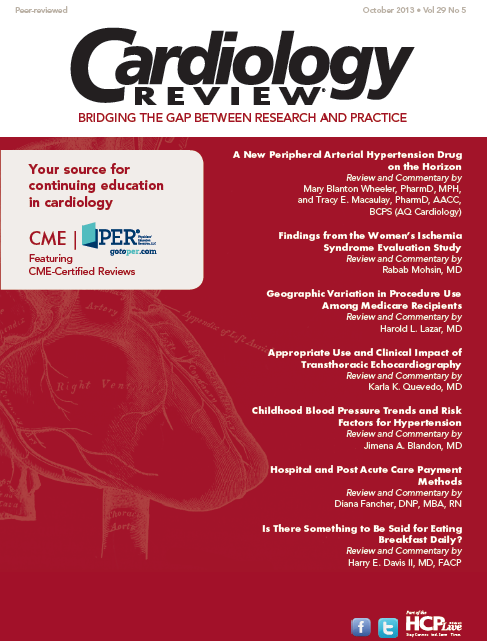Publication
Article
Cardiology Review® Online
What Your Patients Are Reading
Author(s):
Rethinking medical education about obesity and more news that your patients are reading.
Rethinking Medical Education About Obesity
It isn’t only patients who aren’t well informed about obesity — doctors also need to go “back to the drawing board.” That is the conclusion of a recently published Perspectives article in the October 10, 2013, New England Journal of Medicine, which states that doctors simply aren’t trained correctly to tackle this complex problem.

James Colbert, MD, of Brigham & Women’s Hospital, and Sushrut Jangi, MD, at Beth Israel Deaconess Medical Center, said, “Just as obesity treatment should begin while patients are young and behaviors are relatively easy to change, educational programs should be developed for young physicians-in-training that will enable them to recognize, treat, and research obesity.” They suggest that medical education isn’t designed to deal with multidisciplinary conditions like obesity for which there’s no standardized “fix-it” approach for all patients. The two doctors say that physicians in training frequently fail to recognize obesity, are unfamiliar with treatment options, and spend relatively little time treating obesity. Doctors in training need to receive a solid foundation in the science of obesity and then use these fundamentals by applying them clinically through the use of behavioral medicine.
Drs. Colbert and Jangi argue that successful management of obesity requires an interdisciplinary care team that includes physicians, nurses, medical assistants, social workers, behavioralists, and nutritionists. Although the American Medical Association recently declared obesity a disease, fundamental changes are needed early in medical education if any progress is to be made to address this condition.
Does Geography Matter When It Comes to Getting the Right Meds?

The researchers studied hypertension and cholesterol drugs that should be prescribed after a heart attack, bone-building drugs for the elderly prescribed after a broken bone, drugs known to be harmful in the elderly, and discretionary drugs.
The study found no reason for these regional prescribing differences, but the inconsistencies are clear. After all, experts agree about the benefits of beta-blockers and statins after heart attack, and all doctors should be aware of the value of controlling blood pressure and cholesterol in this situation. Yet in San Angelo, TX, 91% of heart attack patients filled prescriptions for beta-blockers in 2008 and 2009, whereas just 62.5% of similar patients in Salem, OR, did. For statins, the rates ranged from 91% of patients in Ogden, UT, to 44% in Abilene, TX.
Oddly, the rates of beta-blocker and statin use did not correlate: regions with high use of beta-blockers do not necessarily have high rates of statin use.
The bottom line, according to Dartmouth Atlas researchers, is that as a nation, we have a lot more to do to ensure that people get the care they need when they need it.
Beta-blockers and statins may be a standard prescription after a heart attack, but a patient in San Angelo, TX, is more likely to get a beta-blocker after a heart attack than a patient in Salem, Oregon, according to a study by the Dartmouth Atlas Project. The Dartmouth Project studies and documents variations in medical care across the country, and the group’s latest study examined prescriptions written for and filled by patients on Medicare.






